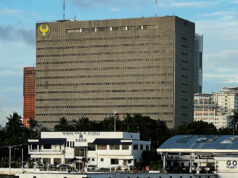Another South Korean bank eyes PHL market
ANOTHER South Korean bank is looking to enter the Philippine market, joining a list of other foreign lenders wanting to cash in on the robust economic growth story and a booming consumer base.
A central bank official said KB Kookmin Bank is in talks with the regulator to establish a branch in Manila, following its attempt to partner with a local lender earlier this year.
If realized, it would be the fourth South Korean bank to enter the Philippines over the last two years, following the signing of a law allowing the full entry of foreign banks.
Seoul-based media reported back in July that KB Kookmin Bank was in talks to acquire a 20% stake in Philippine mid-sized lender East West Banking Corp. However, it was reported that KB Kookmin gave up by August, with Shinhan Bank emerging as the sole bidder for the buyout.
Bangko Sentral ng Pilipinas (BSP) officials have said there are at least eight banks who have expressed interest to set up branches here, as they pursue global expansion plans with a focus on Southeast Asia as the fastest-growing region.
BSP Deputy Governor Chuchi G. Fonacier has said that they expect more foreign banks to look to the Philippines in search for continued growth and good yields. She particularly noted “aggressive” expansions from Taiwanese and South Korean banks as they catch up with their corporate customers who are also setting up businesses in this country.
So far, 11 global lenders have entered the Philippines since the signing of Republic Act 10641 in 2014, which lifted the previous limit that allowed only 10 offshore lenders to operate in the country at a given time. Prior to the new law, a new foreign bank can enter the local scene only if one of the accredited foreign lenders pulls out.
The Philippines is also in the middle of negotiations for cross-border banking with the central banks of Thailand and Indonesia, in line with the ASEAN Banking Integration Framework.
The BSP has concluded talks with the Bank Negara Malaysia in April, which would allow three qualified lenders to set up shop in the other country. — Melissa Luz T. Lopez



